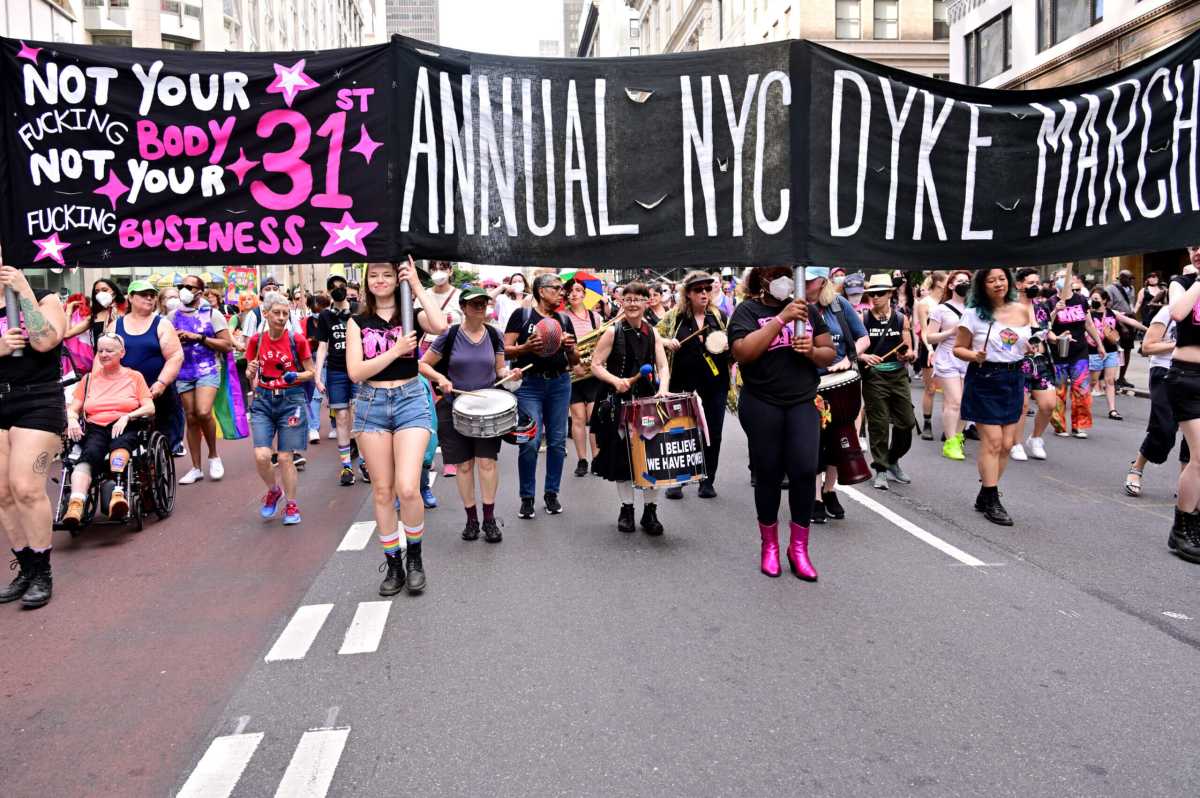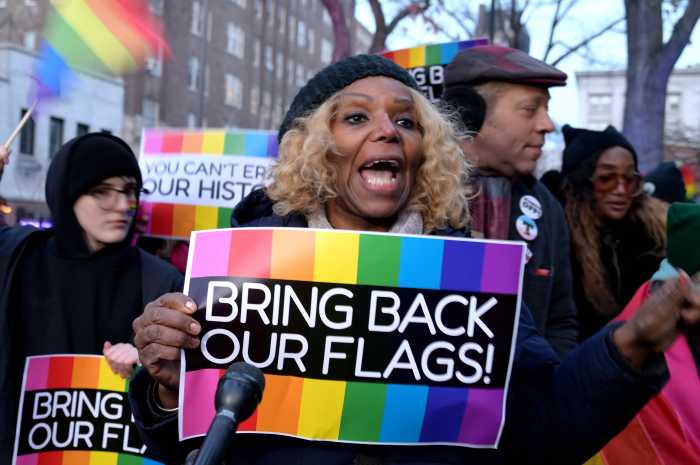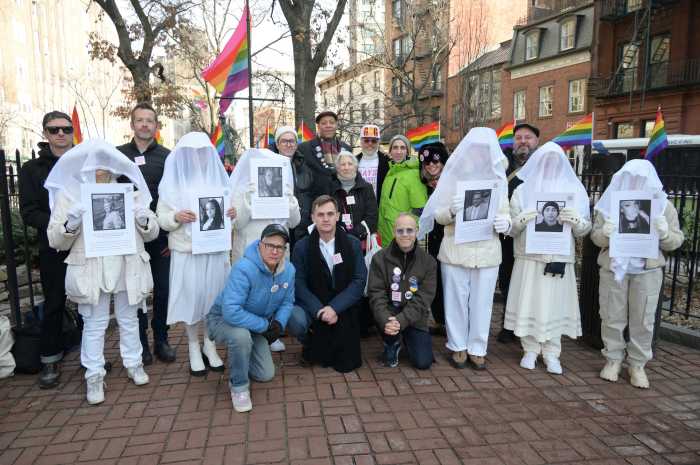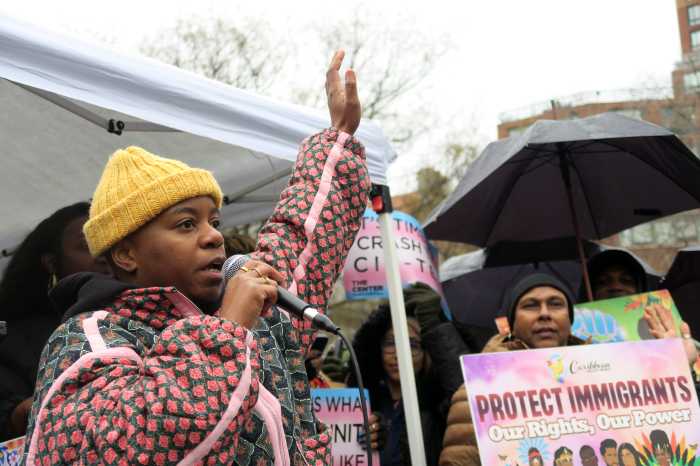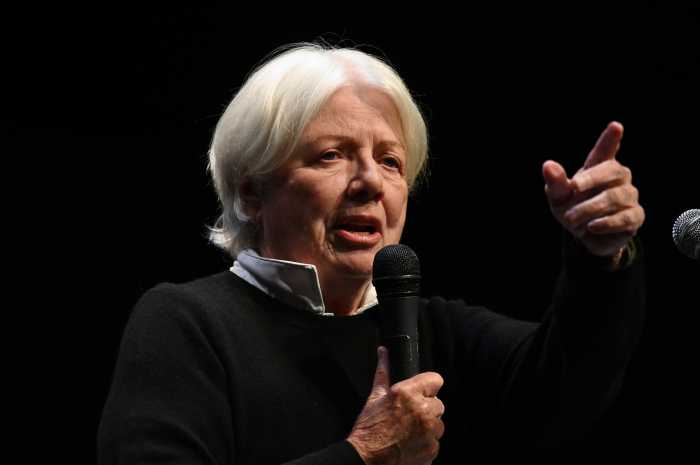The NYC Dyke March, an annual protest march rooted in lesbian visibility and geared towards all self-identified dykes, has seen a drop in participation and increase in backlash this year, according to multiple sources.
In March 2025, the volunteer-run NYC Dyke March published an eight-part statement on Instagram detailing recent structural changes to the Planning Committee. Most notable among these updates was that the Planning Committee had shrunk in size to just five volunteers due to differences in political beliefs and opinions, and was taking a firm stance against Zionism.
The NYC Dyke March declined to comment on the announcement in an email to Gay City News, instead urging anyone with questions or concerns to view their Linktree and website.
“We oppose the nationalist political ideology of Zionism, particularly as it is promoted within US institutions, which continues to be used to subjugate, displace, and marginalize Palestinian people,” NYC Dyke March’s official values statement reads. “We stand against antisemitism in all its forms and recognize that Jewish people have faced historical and ongoing oppression. Our critique is directed at a political system and ideology, not at Jewish people or Judaism.”
The policy drew criticism from Judith Kasen-Windsor, who is the surviving spouse of LGBTQ rights activist Edie Windsor, whose famous 2013 Supreme Court case struck down the Defense of Marriage Act (DOMA).
“Edie loved Dyke March,” Kasen-Windsor said. Edie was a staple at the Dyke March for many years, frequently photographed singing and dancing at the front of the march. After Edie’s passing in 2017, participating in the Dyke March was a way for Kasen-Windsor to honor Edie’s legacy and continue her work advocating for marginalized identities. But since last year, when the Dyke March announced their 2024 theme of “No Pride in Genocide,” Kasen-Windsor has been frustrated with the organization that her late wife gave so much of herself to.
“It was our community, and now it’s not our community anymore,” Kasen-Windsor said, expressing her disappointment with a Planning Committee that she said felt both disorganized and unwelcoming to Jewish people. At one meeting with NYC Dykes earlier this year, when Kasen-Windsor refuted the anti-Zionist policy as exclusionary, tensions escalated and she decided to mute herself for the rest of the meeting. On June 13, the NYC Dyke March emailed Kasen-Windsor to inform her that she was no longer welcome at any planning or organizational meetings.
This year will be the second year she has decided not to join the Dyke March, Kasen-Windsor said, as is the case with many of her friends and friends of Edie Windsor. Instead, Kasen-Windsor is opting to participate in the Shalom, Dykes march taking place on the same day.
“The difference between the two, for lack of a better word, is bipolar,” Kasen-Windsor said. In fact, she pointed out that several former committee members from the NYC Dyke March had moved to Shalom, Dykes in response to the Dyke March’s stance on Zionism.
But for some, the experience offered by Shalom, Dykes as a space for those who feel rejected or excluded by Dyke March doesn’t necessarily feel like a step in a more inclusive direction.
“Any more bifurcation that happens feels like a tragedy,” said Rabbi Marisa Elana James, director of social justice programming at the Congregation Beit Simchat Torah (CBST), a progressive Jewish community in New York City. She says that her congregation — many members of which have attended Dyke March in the past — have come to her with varied responses to the Planning Committee’s anti-Zionist policy.
“We have folks in the community who are like, ‘Great, I’m going to be there, this is wonderful, I’m perfectly comfortable with this,’” Rabbi Marisa said, “And we’ve people who are like, ‘I can never be in this space again, it feels like this is just meant to exclude me and anyone like me, and I feel like I’m in mourning for a family that I’ve now lost’ — and everything in between.”
Rabbi Marisa said that last year’s Dyke March message spoke to a future focused on Palestinian liberation and preserving safe spaces for all queer and religious identities, rather than one that excluded specific groups and sowed division amongst identities.
“I think the thing that hurts the most for longtime Dyke Marchers is that the Dyke March has always been this ‘bring everything of who you are’ kind of space,” Rabbi Marisa said. To her, the march has historically allowed people at all stages of unlearning systemic hate and injustice to come together and learn together.
“[The Dyke March Planning Committee’s anti-Zionist policy] wound up telling a lot of people — who actually 100% care about Palestinian liberation — that this is a space that is not for them,” Rabbi Marisa said, “And that’s the thing that really breaks my heart.”
The NYC Dyke March will take place on Saturday, June 28.

